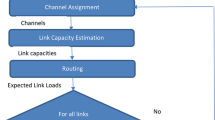Abstract
Wireless mesh networks appear a promising solution for providing ubiquitous low-cost wireless access, but cannot rely on simple CSMA access protocols because of the critical inefficiencies that arise in topologies with hidden nodes. To overcome these limitations, some important protocol extensions based on synchronization and reservation mechanisms have been ratified.
In this paper we show that an alternative approach to the standardization of new features and signaling messages for mesh networks can be the utilization of programmable nodes able to execute different MAC protocols programmed on the fly. Signaling messages are used only for disseminating the new protocol among the nodes. The scheme, that we call pseudo-TDMA, can be optimized as a function of the node density in the network. Apart from the numerical evaluations, we also run some experiments by exploiting our prototype of wireless programmable node called Wireless MAC Processor.
Access this chapter
Tax calculation will be finalised at checkout
Purchases are for personal use only
Preview
Unable to display preview. Download preview PDF.
Similar content being viewed by others
References
Xu, S., Saadawi, T.: Revealing the problems with 802.11 medium access control protocol in multi-hop wireless ad hoc networks. Computer Networks 38(4), 531–548 (2002)
Tinnirello, I., Bianchi, G., Gallo, P., Garlisi, D., Giuliano, F., Gringoli, F.: Wireless mac processors: Programming mac protocols on commodity hardware. In: 2012 Proceedings IEEE INFOCOM, pp. 1269–1277. IEEE (2012)
Bianchi, G., Gallo, P., Garlisi, D., Giuliano, F., Gringoli, F., Tinnirello, I.: MAClets: active MAC protocols over hard-coded devices. In: Proceedings of the 8th International Conference on Emerging Networking Experiments and Technologies, pp. 229–240. ACM (2012)
Lyakhov, A., Pustogarov, I., Safonov, A., Yakimov, M.: Starvation effect study in IEEE 802.11 mesh networks. In: Proc. of Third IEEE International Workshop on Enabling Technologies and Standards for Wireless Mesh Networking, MeshTech 2009, Macao SAR, P.R. China (2009)
IEEE Standard for Information technology: Part 11: Wireless LAN Medium Access Control (MAC) and Physical Layer (PHY) Specifications (February 6, 2012)
Krasilov, A., Lyakhov, A., Safonov, A.: Interference, even with MCCA channel access method in IEEE 802.11s mesh networks. In: Mobile Adhoc and Sensor Systems, MASS 2011, pp. 752–757. IEEE (2011)
Huang, L., Lai, T.H.: On the scalability of IEEE 802.11 ad hoc networks. In: Proceedings of the 3rd ACM International Symposium on Mobile Ad Hoc Networking & Computing, pp. 173–182. ACM (2002)
Shi, J., Salonidis, T., Knightly, E.W.: Starvation mitigation through multi-channel coordination in CSMA multi-hop wireless networks. In: Proceedings of the 7th ACM International Symposium on Mobile Ad Hoc Networking and Computing, pp. 214–225. ACM (2006)
Tinnirello, I., Scalia, L., Campoccia, F.: Improving IEEE 802.11 performance in chain topologies through distributed polling and network coding. In: IEEE ICC 2009, pp. 1–6. IEEE (2009)
Tao, Z., Teo, K.H., Zhang, J.: Aggregation and concatenation in IEEE 802. 16j mobile multihop relay (MMR) networks. In: IEEE Mobile WiMAX Symposium 2007, pp. 85–90. IEEE (2007)
Katti, S., Rahul, H., Hu, W., Katabi, D., Médard, M., Crowcroft, J.: XORs in the air: practical wireless network coding. ACM SIGCOMM Computer Communication Review 36(4), 243–254 (2006)
Xu, S., Saadawi, T.: Does the IEEE 802.11 MAC protocol work well in multihop wireless ad hoc networks? IEEE Communications Magazine 39(6), 130–137 (2001)
Akyildiz, I.F., Wang, W., Wang, W.: Wireless mesh networks: a survey. Computer Networks 47(4), 445–487 (2005)
He, Y., Yuan, R., Sun, J., Gong, W.: Semi-Random Backoff: Towards resource reservation for channel access in wireless LANs. In: 17th ICNP 2009, pp. 21–30. IEEE (2009)
Koutsonikolas, D., Salonidis, T., Lundgren, H., LeGuyadec, P., Hu, Y.C., Sheriff, I.: TDM MAC protocol design and implementation for wireless mesh networks. In: Proceedings of the 2008 ACM CoNEXT Conference, p. 28. ACM (2008)
Djukic, P., Mohapatra, P.: Soft-TDMAC: A software TDMA-based MAC over commodity 802.11 hardware. In: INFOCOM 2009, pp. 1836–1844. IEEE (2009)
CREW, Cognitive Radio Experimentation World, http://www.crew-project.eu/
Author information
Authors and Affiliations
Editor information
Editors and Affiliations
Rights and permissions
Copyright information
© 2013 Springer-Verlag Berlin Heidelberg
About this paper
Cite this paper
Tinnirello, I., Gallo, P. (2013). Supporting a Pseudo-TDMA Access Scheme in Mesh Wireless Networks. In: Bianchi, G., Lyakhov, A., Khorov, E. (eds) Wireless Access Flexibility. WiFlex 2013. Lecture Notes in Computer Science, vol 8072. Springer, Berlin, Heidelberg. https://doi.org/10.1007/978-3-642-39805-6_8
Download citation
DOI: https://doi.org/10.1007/978-3-642-39805-6_8
Publisher Name: Springer, Berlin, Heidelberg
Print ISBN: 978-3-642-39804-9
Online ISBN: 978-3-642-39805-6
eBook Packages: Computer ScienceComputer Science (R0)




